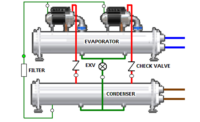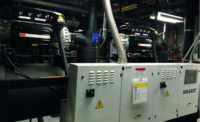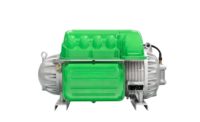One of the key challenges for institutional buildings (schools, universities, and hospitals/health care) is getting the best possible performance from the HVAC chiller while keeping maintenance costs to a minimum. Institutional buildings need their HVAC chiller systems operating at peak performance due to the high number of operating hours but also need to keep maintenance costs low because of limited maintenance staff and budget.
Oil-free compressors can be the right choice to meet these needs by offering unique capabilities in terms of performance while also reducing maintenance costs when compared to traditional compressors using an oil management system. Traditional compressors, such as screw type, require oil for several reasons, including lubrication of the compressor bearings to support the movement of the rotor and to form a seal to prevent refrigerant from traveling in the opposite direction.
Oil-free compressors using magnetic bearing technology, on the other hand, create a magnetic field that allows the motor shaft to levitate and avoid metal to metal contact. This eliminates the need for oil as a lubricant, and, thus, the entire oil management system on the chiller consisting of oil pumps, heaters, sumps, and separators along with the cost of installing these components. The result is a chiller system providing optimum performance and a simple design requiring less maintenance compared to traditional oiled systems.
Oil-free compressor technology provides superior performance simply because oil is removed from the chiller system. Over time, oil deposits into the chiller’s heat exchangers create an insulating barrier on the heat exchanger tubes, which causes significant degradation of chiller efficiency and capacity. Numerous independent, third-party studies, such as ASHRAE Research Project 751 and ASHRAE Research Study 601, have concluded the majority of traditional oiled chillers installed in the field are overcharged with oil, resulting in degraded performance compared to their original ratings.
The performance advantages achieved through the elimination of oil from the chiller system can also be maintained throughout the life of the compressor. Since there is no oil to inhibit performance and no mechanical wear of the internal components, this results in compressor performance that remains unchanged during the entire operating life span.
To validate the performance benefits, Danfoss and Smardt Chiller Group initiated a research project in 2018 to compare the present-day performance of Danfoss Turbocor® compressors with their performance when shipped “new” from the Danfoss factory. Three compressors in operation for more than 10 years were sent to the Danfoss Tallahassee lab, and the test results showed no significant change in efficiency or capacity over time.
“The results of the analysis study clearly demonstrates that oil-free compressors maintain consistent performance through their entire operating life,” said Vince Canino, CEO Smardt Chiller Group. “All too often, customers fail to enjoy a lifetime of energy savings because of the effects oil can have on the compressors and in our chillers. Because many customers do not invest in measuring and monitoring devices to calculate chiller capacity and efficiency every minute of operation, they really don’t know what they have 10 years later. Taking oil out of a chiller system means the energy savings can be realized over the life of the compressor.”
Additionally, traditional compressors, such as screws, incur mechanical wear through metal-to-metal contact that not only affects performance but also increases the noise levels up to 8 dbA compared to a similar size oil-free compressor. By eliminating the metal-to-metal contact, oil-free compressors are able to reduce sound levels and minimize customer complaints.
An example of how lower sound levels can minimize customer complaints was demonstrated when an aging chiller at a Canadian public sector facility was replaced. The aging chiller was operating above 90 dB, which made communication around the system extremely difficult. A 250 TR Smardt model WB088.2H water-cooled chiller with Danfoss Turbocor compressors was used to replace the older chiller, which lowered sound levels such that communication around the new chiller while it was in operation was possible.
During the initial implementation, oil-free compressors had an operating range that limited it to air- or water-cooled chiller applications. Recent advancements in technology have extended the operating map to allow for use in higher lift applications, where traditional oiled compressors have been applied. With these changes, the benefits of oil-free, magnetic-bearing technology can be utilized in higher lift applications, such as air-cooled chillers in hot ambient climates, heat pumps, heat recovery, low temperature process, and thermal storage systems.
While long-term performance and application flexibility are obvious benefits, there is another less obvious one with oil-free compressor technology in terms of maintenance. Removing oil from the chiller system results in a more simplified chiller design that eliminates frequent maintenance tasks required on traditional oiled chiller systems, such as analyzing the oil for contaminants and changing the oil and filters.
A chiller with an oil management system adds significant components and design complexity to the system. A typical oil management system includes components, such as an oil separator (separates the oil from the refrigerant), oil cooler (reduces the temp of the oil because hot oil loses some of its lubrication properties), oil heater (boils off refrigerant from the oil to prevent dilution), and an oil pump (circulates the oil through the system). When factoring in the costs associated with maintaining and inspecting an oil management system, this can add up to $3,650 in annual maintenance or $83,950 over the life of the chiller.
A chiller using oil-free compressor technology has significantly fewer mechanical parts and design complexity since all the components associated with the oil management system are eliminated. This results in reduced maintenance and higher reliability over the life of the chiller.
“Oil-free chillers result in a much simpler design with approach to operations and maintenance,” Canino said. “We jokingly say our techs show up with a screwdriver and a laptop and not a tool cart. High tech translates to fewer maintenance tasks for our customers. Further, oil-free chillers do not require major maintenance events which typically occur on oil-based systems in year 10, when they have to overhaul the oil-based compressors. This is a costly major maintenance that building owners aren’t always aware of until it actually happens. That’s a surprise no manager wants to deal with. With oil-free, we are major maintenance-free. So, when you factor the consistent lifetime performance, reduced maintenance tasks, and no major maintenance events, it is clear that oil-free chillers provide our customers the lowest total cost of ownership of any technology today thanks to the Danfoss Turbocor oil-free compressors.”
Oil-free compressor technology can be an effective solution to meet the needs of institutional buildings when selecting an HVAC chiller system. Oil-free compressors provide clear benefits in both performance and maintenance through the removal of the complex oil management system. This includes zero performance degradation through the entire operational life of the compressor, flexible map to support a wide range of application conditions, low sound levels that minimizes noise complaints, and low maintenance costs with up to $83,950 in lifetime maintenance cost savings.








